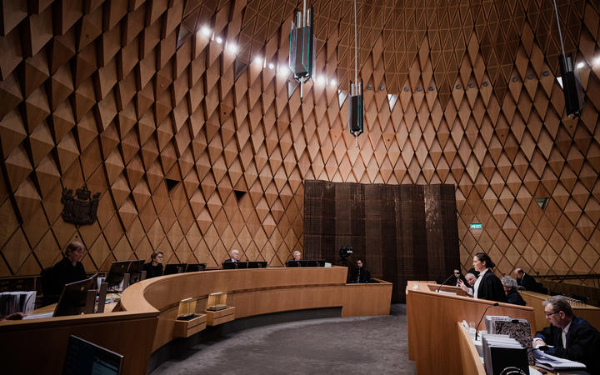The appeal of the now deceased convicted pedophile Peter Ellis should be reopened, because the mana of a person remains after their death, the Supreme Court has heard.

Ellis died in September last year, just months after his appeal against his conviction was lodged in the Supreme Court, which would ordinarily mean his appeal would be terminated.
Over 100 people turned out to hear the landmark case in the Supreme Court today, which could change whether appeals are heard after death.
Counsel for Peter Ellis, Natalie Coates, told the Supreme Court, that the tikanga of mana - which was described as meaning reputation, standing, power, and influence; and applies to both an individual and a collective, should be reason for the appeal to be heard.
"In accordance with tikanga, everyone - Māori and Pākehā - including Mr Ellis and his whānau, have mana.
"Mana and the importance of seeking to restore and uphold mana is something that transcends death.
"A hara, or a wrong, is before the court, and a door has been opened to seek to redress this. It's necessary for this case to continue to get to a state of ea, or finality."
Coates argued that if the appellant was successful in getting the convictions set aside, that would have an impact on his mana, and that of his whānau, "who were impacted by the allegations, convictions and the associated stigma of the offences which are at the most serious end".
She used a whakataukī by the first Māori king, Kingi Potatau te Whero Whero, "Ko tahi te kohao o te ngira, e kuhuna ai te miro ma, te miro pango, te miro whero."
This translates as, "there is one eye of the needle that all the different coloured threads pass through", and Coates argued that tikanga Māori was a thread that can and should be added to the fabric of the law in Aotearoa.
Coates said that in order for Peter Ellis and his whānau to achieve ea, or a state of closure, the matter must be aired in the court.
She cited the recent Rua Kēnana pardon as an example of how a hara can be addressed long after the person has passed away.
She also cited the inclusion of the Treaty of Waitangi in legislation, and the recognition of mana and other tikanga Māori in the likes of the Oranga Tamariki Act as evidence of the fact tikanga Māori is already a part of common law.
Supreme Court Justice Joe Williams raised concerns that if tikanga Māori was to be further incorporated into law, it would be "handing this body of law over to judges", who may have a simplistic understanding of tikanga like mana.
Coates said they recognised this was a risk, but their panel of tikanga experts, which included the likes of Hirini Mead and Pou Temara, had said that tikanga has already managed to exist since time immemorial, despite the "trials and tribulations that the state legal system had had on tikanga".
The solicitor general, acting for the Crown, Una Jagose, disagreed that a full hearing was needed.
Jagose QC said that while she accepted the hara with the case, and that further investigating into the case was needed, that could be achieved at the appeal today, rather than at a full hearing.
She also argued that an appeal would create hara for all the victims and their families, and the wrong-doing against the victims outweighed the hara of the appellant and his whānau.
Te Hunga Roia, the Māori Law Society, was also represented at the hearing by Mataanuku Mahuika.
They applied to intervene and submit on the basis that the issues before the court involved considerations of tikanga and Te Hunga Roia have an interest in how the courts interpret the extent to which tikanga is applied to common law.
Mahuika argued that the concept of ea, is more than just something being completed, it is about fulfilment.
He accepted that a full resolution was going to be very difficult in this instance, but from a tikanga Māori point of view, you have to probe until you cannot any longer.



 Binoy Kampmark: Gender Stunts In Space - Blue Origin’s Female Celebrity Envoys
Binoy Kampmark: Gender Stunts In Space - Blue Origin’s Female Celebrity Envoys Richard S. Ehrlich: A Deadly Earthquake & Chinese Construction
Richard S. Ehrlich: A Deadly Earthquake & Chinese Construction Ian Powell: It Does Matter To Patients Whether They Are Operated In A Public Or Private Hospital
Ian Powell: It Does Matter To Patients Whether They Are Operated In A Public Or Private Hospital Gordon Campbell: On Marketing The Military Threat Posed By China
Gordon Campbell: On Marketing The Military Threat Posed By China Binoy Kampmark: Olfactive Implications - Perfume, Power And Emmanuel Macron
Binoy Kampmark: Olfactive Implications - Perfume, Power And Emmanuel Macron Martin LeFevre - Meditations: True Abundance
Martin LeFevre - Meditations: True Abundance